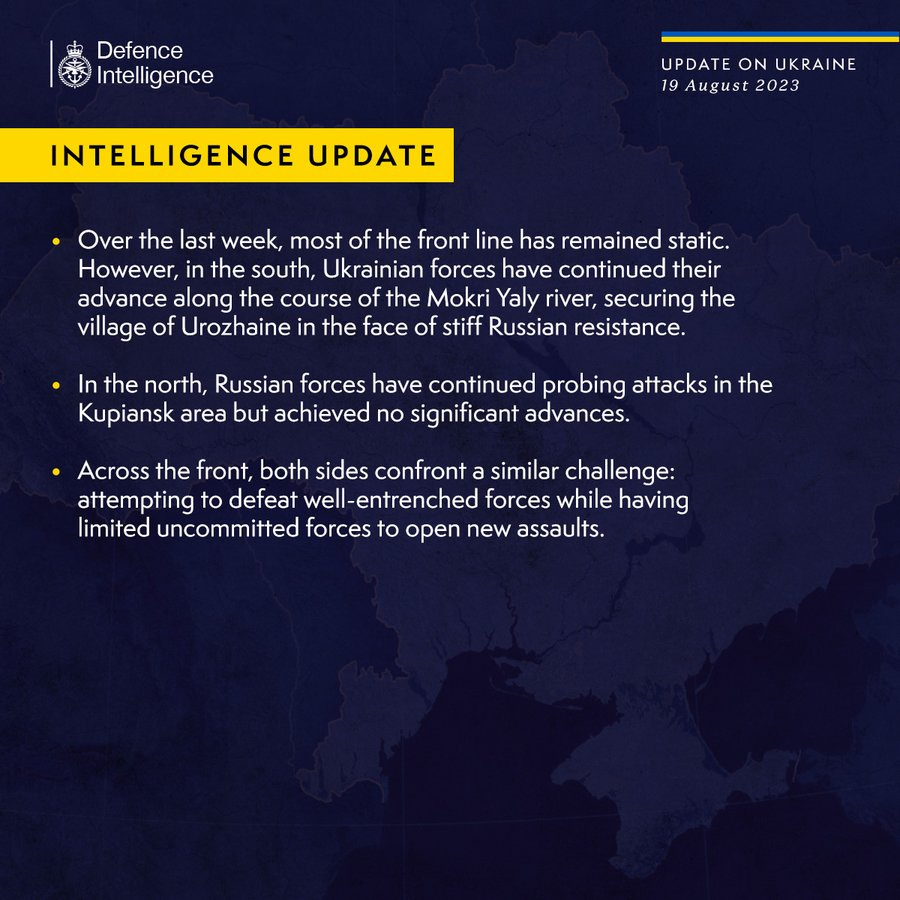Catching up…
EA Worldview’s Ukraine Up-date- hop over to Scott’s amazing hourly Ukraine up-date page. I’ll fill in with some bits and bobs.
Stories we’re following…
A Russian Iskander ballistic missile hit the Chernihiv city centre at noon on Saturday, killing 7 people and wounding 129—15 police officers, 15 are children. 25 people were hospitalized. Noon—it was purposefully done at that time when many people would be walking the streets in the sunshine.
President Zelenskyy released this statement on his official channel about the strike:
This is what a neighborhood with a terrorist state is, this is what we unite the whole world against. A Russian missile hit right in the center of the city, in our Chernihiv. A square, the polytechnic university, a theater. An ordinary Saturday, which Russia turned into a day of pain and loss. There are dead, there are wounded. My condolences to those who lost loved ones! All services are on the site. Rescuers, police, doctors. Everyone who is needed.
On the two children killed by the Russian missile attack, he said: “They were just out walking with their parents.”
Russian drone attack damages nearly 400 buildings in Khmelnytskyi Oblast overnight. Russia's overnight drone attack damaged nearly 400 buildings in Khmelnytskyi Oblast, Serhii Tiurin, first deputy head of the Khmelnytskyi Oblast Military Administration, told Suspilne.
War update Aug 19: Invaders unsuccessfully advancing in four sectors. Attempts by Russian troops to advance in the Kupiansk, Lyman, Bakhmut and Avdiivka sectors were unsuccessful, whereas in the Marinka sector, Ukraine's defense forces continue to hold back an enemy offensive. Throughout Aug 18, Russian invaders launched a missile strike, 31 airstrikes and 45 MLRS attacks on the positions of Ukraine's defense forces and populated areas.
Ukrinform: Ukraine's defense forces continue their offensive operation in the Melitopol and Berdiansk sectors. The defenders are consolidating their positions and carrying out counter-battery measures. In total, throughout the day, Ukrainian aircraft carried out nine strikes on the areas of concentration of personnel, weapons and military equipment of the Russian army.
Ukrainian pilots start training on F-16s, test flights on Swedish Gripen jets. Ukrainian pilots have already started a six-month training session on U.S.-made F-16 fighter jets, Defense Minister Oleksii Reznikov said on national television on Aug. 19.
Lieutenant General Mykola Oleshchuk, Head of Ukraine’s Air Force, has said that Western-made F-16 fighter jets have already touched down on Ukraine’s airfields, Mykola Oleshchuk reported on Ukraine’s national 24/7 newscast.
Oleshchuk also said that Ukraine is currently preparing its runways [for F-16 jets]. "We are making the necessary alterations, improving the surface, improving our airfields’ infrastructure, and building new defence facilities," he explained.
"So I think we will be able to bring these aircraft to Ukraine as soon as we acquire them," Oleshchuk concluded.
The Ministry of Defense of the Russian Federation said that one aircraft was damaged as a result of an attack by a Ukrainian UAV on Soltsy-2 air base in Novgorod. The air base is home to the Tupolev Tu-22M3, a strategic bomber used also for missile attacks against Ukraine.
US officials told CBS News that the Ukrainian military appears to have made progress in its offensive against the Russian-occupied town of Tokmak, an important barrier city between Ukrainian forces and the city of Melitopol in Zaporizhzhia Oblast. A US official told CBS News on Thursday that Ukrainian troops have broken through a Russian minefield north of Tokmak and are now fighting the first line of Russian defence holding the city.
Michael MacKay: The Russian forces shelled more than 20 settlements in Zaporizhzhya region, including Levadne, Zatyshshya, Novoandriyivka, Stepove, P'yatykhatky and Plavni. They carried out air strikes on Robotyne and Mala Tokmachka.
Russians ban civilians from moving between Hola Prystan and Kinburn Spit. The Russian invaders have banned the movement of civilians between Hola Prystan and the Kinburn Spit from August 15 to 26 to prevent information leaks about the powerful movement of enemy equipment and troops.
The Russian military is preparing the crews of its ships to counter naval drones, according to the media center of the Armed Forces of Ukraine.
“Such training of crews, as well as calculations of coastal troops, is carried out simultaneously with anti-sabotage protection measures for Russian fleet bases in the Black and Azov Seas. According to available information, the enemy is also trying to improve the system of defensive positions and areas on the territory of Crimea,” the Ukrainian military said in a statement.
Washington Post: US intelligence thinks Ukraine will fail to reach CO’s key goal. The U.S. intelligence assesses that Ukrainian forces will fail to reach the key southeastern city of Melitopol in this year’s counteroffensive, the Washington Post reported, citing unnamed sources familiar with the forecast.
Monique: The WaPo article is making its rounds amongst the talking heads on TV and other media outlets. For context, US Defence games many scenerios, as do all NATO member states, and this is one of them. The slow delivery of armaments and ammunition by the US and other Ukrainian allies provided the opportunity for Russia to fortify and entrench their lines of defence (see explainer below). What remains a mystery is who leaked this material to WaPo and why.
Explainer on what kind of obstacles the Ukrainian forces are encountering as they try to break through Russia’s entrenched defensive lines—the Surovikin line.
SITA announced its plans to withdraw from Russia in May 2023. The Russian airline industry, largely dependent on the IT products developed by the Swiss corporation SITA (Societe Internationale de Telecommunication Aeronautiqes) for booking, flight messaging, baggage tracking, and other industry-specific applications, is bracing itself for disruptions when SITA leaves the Russian market this fall.
The independent news outlet RBC writes that Russian flight operators are alarmed by the prospect of being disconnected from SITA’s services, on which the global airline industry runs. Aviation insiders feel that the problem is “highly sensitive and definitely requires a solution.”
Monique: The tweet below touches on an aspect of Russia’s war that has been discussed in numerous news stories in the Russian diaspora press. Russia sends their troops to die in Ukraine and their families do not end up receiving ‘coffin money’ or disbursements for other social programmes.
I saw a video yesterday of a Russian woman who went to occupied Donetsk, desperate to find out if her husband was dead or alive given that she hadn’t heard from him in over 2 months. It shows that some units do not rotate their soldiers by pulling them from combat on the front lines and sending them home to rest. The lack of rotation means the Russian troops experience severe fatigue. My hope is that more and more Russian soldiers desert their units or surrender to the Ukrainian forces.
Russia, Turkey, Qatar prepare new agreement on grain exports. The governments of Russia, Turkey, and Qatar are preparing a new agreement on grain exports following Moscow's termination of the grain deal, the German newspaper Bild reported on Aug. 18, citing official correspondence it has obtained.
Romania wants to transit 60% of Ukrainian grain. Bucharest hopes that around 60% of Ukrainian grain exports could transit through Romanian territory following Russia's unilateral termination of the grain deal, the country's Prime Minister Marcel Ciolacu said on Aug. 18, Reuters reported.
Zelensky signs budget bill in line with IMF program. President Volodymyr Zelensky has signed a bill designed to ensure the predictability of budget policy and to strengthen debt sustainability, lawmaker Yaroslav Zhelezniak announced on Aug. 18.
Monique: Over the past few weeks, president Zelensky and the Ukrainian government have taken steps to prepare for Ukraine’s entry into the EU and NATO. Budget policy, the reforms to Ukraine’s Supreme Court, and the anti-corruption measures and arrests of corrupt officials falls into the government’s strategic goals.
President Zelenskyy visited Sweden on Saturday, saying he was there to meet with Ulf Kristersson, Sweden’s prime minister, the royal family and other officials to thank them for supporting Ukraine amid Russia’s invasion.
The Russian war against Ukraine cannot be an exclusively European problem, Joe Biden said: "There hasn't been such an invasion since the Second World War. Russia has already lost. It cannot achieve its initial goal, which it declared. It is impossible," he said at a tripartite summit with the Prime Minister of Japan and the President of South Korea.
The intelligence services of Latvia (SGB) have arrested a taxi driver accused of being a Russian spy. It collected information on Allied personnel and equipment, oil infrastructure at ports (Riga, Ventspiels), and the unloading of drones. According to the State Security Service, this person was engaged in the purposeful collection and transmission of information about what was happening in the country to the pro-Russian organization Anti-Fascists of the Baltics. His assignments were tasked to him via their Telegram channel.
Rheinmetall will start servicing tanks in Ukraine by the end of August. According to Rheinmetall CEO Armin Papperger, the first 12 employees that will work in Ukraine have started training in Germany, and 12 more will join them later.
UK’s Ministry of Defence signs £90m contracts to strengthen Ukraine’s air defence. Three contracts to deliver air defence equipment to Ukraine worth more than £90m (more than $114 million) have been signed by the Ministry of Defence on behalf of the International Fund for Ukraine (IFU). The contract with Kongsberg will purchase vehicle-mounted counter-drone systems to detect, track, destroy or disrupt UAS.
Canada is imposing sanctions on 15 Russian individuals and three entities in what Ottawa said was a response to rising levels of human rights violations and violence faced by political opponents and critics in Russia, Reuters reports, citing the foreign ministry. The sanctioned individuals and entities are senior officials of the Russian government, judiciary and investigative committee, as well as federally funded courts, the ministry said in a statement.
Politico: The German government on Wednesday stepped back at the last minute from making a legal commitment to meeting NATO’s target of spending 2 percent of GDP on defense on an annual basis, according to Reuters and German newspaper Süddeutsche Zeitung. A government official told Politico that a clause pledging to meet the target was deleted at short notice from Finance Minister Christian Lindner’s draft of a new budget financing law, just before the Cabinet passed it to the parliament. Instead, the government pledges to meet the 2 percent target on average over a five-year period, as already set out in the recently published National Security Strategy.
WSJ: US concerned over Turkish companies helping Russia evade sanctions. The U.S. is concerned that Turkey has become a hub for Russian sanctions evasion, including a ghost fleet for Russian oil and port calls for Russian vessels carrying weapons and sanctioned goods, the Wall Street Journal reported on Aug. 18.
Yevgeny Shvidler, a longtime friend and business partner of Roman Abramovich, came under British sanctions after the Russian invasion. He sued for their removal and lost. Shvidler, a US and British citizen with a net worth of $1.6 billion, asked the court to declare the sanctions against him illegal and remove the seizure of assets, including two aircraft that have been collecting dust in the hangar of a London airport for more than a year. However, Judge Neil Garnam rejected all the arguments of Shvidler's lawyers and ruled in favor of the British government on Friday.
Former Austrian Chancellor Sebastian Kurz has been charged on suspicion of making false statements during a government inquiry into the so-called Ibiza Scandal. The charges were announced Friday morning by Austria’s Economic and Corruption Prosecutor’s Office more than two years after Kurz confirmed he was under investigation. Criminal charges were also filed against Kurz’s former head of Cabinet, Bernhard Bonelli, Austrian media reported.
Evacuations: Canada's western province of British Columbia declared a state of emergency as firefighters battled wildfires, forcing thousands of evacuations. On the Spanish island of Tenerife more people were evacuated from their homes as a wildfire raging in the north of the island remained out of control.
The Supreme Court in Italy confirms: Whoever arrives in Italy to ask for protection cannot be called an "illegal", not even in a political manifesto. The League's appeal rejected.
Piero Castellano: “Asylum right is a human right -it protects all humans, including those lucky enough not to need it yet. The Italian Court of Cassation confirms sentence condemning Lega for calling all migrants "illegals". To ask for asylum protection is NOT illegal.
Fake videos on Austrian TV broadcaster
Austria’s state broadcaster ORF aired a story filmed by their correspondent in Ukraine, Christian Wershütz, which covered corruption and problems with Ukraine’s military draft on the Zeit im Bild show. The correspondent used two videos he said he had obtained from Ukrainian sources, allegedly proving that "not all men are ready to fight for their country." The short clips showed what was claimed to be the arrest of conscripts by the military from the draft office.
Both clips, as Ukrinform wrote, have nothing to do with the ongoing mobilization campaign. One showed an incident at the border, where a student was indignant because of the ban on leaving country. He was detained because he refused to leave the border guards office and the border checkpoint. Another video showed the arrest of a Russian intelligence asset in Odesa by the operatives from the Security Service.
The videos, and many others like them, are circulating widely on Russian-aligned Telegram channels. A typical video will show a van pulling up to a man walking on the street and taking him by force to be enlisted in the army. I came across them the first time about a month ago. The Russians do this: they’ll drive into a village and yank in men who may be walking by. That’s why I immediately thought that the videos were fake or were filmed in Russia.
What is absolutely incredible is that the Austrian state broadcaster would air fake videos on their show. I shouldn’t be given how many Austrian officials are still aligned with the Kremlin and actively work to advance its position in official goverment policy. Austria also has a real problem when it comes to Russian spies working in the Russian embassy in Vienna and the consulate in Salzburg. They collect intelligence via electronic and human means. While most Western allies have expelled anywhere from 30 plus Russian ‘diplomatic’ personnel, the Austrians have sent home only nine as reported by DW.
Next to Hungary, Austria is seen as one of Russia's few friends in the EU. Let’s not forget that Putin flew in as a surprise guest for the wedding of Austrian former Foreign Minister Karin Kneissl. In 2018, the annual report of the Austrian Federal Office for the Protection of the Constitution and Counterterrorism (BVT) says Austria is a "favoured area of operations" for foreign spies and the number of intelligence agents remains "high". At the time, the head of the BVT, Peter Gridling, couldn’t say how many Russian spies were operating in Austria but it was "a community of hundreds of people".
ORF admitted on social media that the videos showing the “forced military draft” did not pertain to the issue.
"Further study and another review conducted by ORF showed that the mentioned footage from Ukraine does not correspond to the content reported by Zeit im Bild on August 16, which ORF deeply regrets," the message reads.
Disinformation experts said the errors made should be highlighted and fixed. "ORF will do this to Zeit im Bild and, of course, correct the report with footage from Ukraine," the broadcaster added.
Ammunition scam uncovered by Ukraine’s SBU
The Security Service of Ukraine reports the disclosure of a corruption scheme that led to the disruption of the state order for the production of a large batch of ammunition for the Armed Forces of Ukraine. We are talking about the implementation of a defense contract for the supply of artillery mines for a total amount of almost 270 million hryvnia (7.3 million dollars).
According to the contracts, three private companies (their names were not disclosed) were supposed to ship combat weapons to the Ministry of Defense of Ukraine by February 2022.
However, by this time, the companies delivered to the Ministry of Defense only a part of the ordered mines, which, moreover, turned out to be defective due to the use of low-quality gunpowder in them.
On the basis of the collected evidence, two company managers were notified of suspicion under Part 4 of Art. 190 of the Criminal Code of Ukraine (fraud committed on a large scale).
An investigation is ongoing to bring to justice all persons involved in the embezzlement. Perpetrators face up to 8 years in prison.
Comprehensive measures were carried out jointly by the National Police under the procedural guidance of the Kyiv Specialized Prosecutor's Office in the field of defense.
Shawn Walker, Russia turning to sleeper cells and unofficial agents—The Guardian
“The time after the war, with all the expulsions, was a fateful time for the Russian intelligence system and they have tried to replace it with different things,” one European intelligence official told the Guardian in spring.
Many avenues that Russia previously used for its aggressive espionage operations have been shut down. Since the war it is much harder for any Russian citizens to obtain visas for travel to Britain or the Schengen zone, meaning people like the Skripal attackers would now struggle to obtain visas even if their links to the GRU were not detected.
All of this has meant Russia has turned to activating sleeper cells or passing on more active espionage work to unofficial agents and operatives. These may be third-country nationals, or they may be “illegals” – Russian operatives posing as third-country nationals, who spend years painstakingly building up their cover.
Illegals, a holdover from a Soviet-era programme, traditionally do little active espionage work, allowing them to blend into societies for longer-term missions.

















